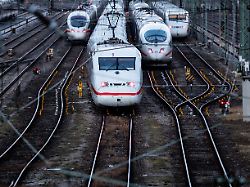Because of the shortage of skilled workers
FDP wants to replace train drivers with AI
January 25, 2024, 5:31 p.m
In Germany, almost all Deutsche Bahn trains are currently at a standstill due to a strike by train drivers. If the FDP has its way, rail vehicles will also be controlled by AI in the future. GDL boss Weselsky sees Germany as “technically not nearly as far along.”
According to a “Bild” report, the FDP is relying on increasing automation of the train driver profession. According to the Liberals, in the next 15 years one in five train drivers will be replaced by artificial intelligence, as the newspaper reported with reference to an internal party paper. This would allow trains to be used more flexibly and efficiently.
This fits “with the ambitious and sensible environmental goals of Deutsche Bahn,” said the transport policy spokesman for the FDP parliamentary group, Bernd Reuther. “In view of the shortage of skilled workers in the transport sector, this is an important step in responding to the increasing need for mobility.”
GDL boss Claus Weselsky, however, does not fear that robots or artificial intelligence will soon replace train drivers. “The former railway boss Rüdiger Grube shouted into the forest a few years ago that we will be fully automated in 2025. What will we see in 2025? Nothing,” Weselsky told “Stern”. “Driving fully automated railway trains is only possible in sections of the route that are completely isolated. You need a completely different system. We are talking about 34,000 kilometers of open track network.”
Shortage of skilled workers at the railway
“Technically speaking, we are nowhere near the stage where we can drive fully automatically at high speeds. It is not that easy to control speed and mass using computer technology,” says Weselsky. In the long term, however, he believes a certain development in this area is possible. “If we live in a fully automated world and everyone just wants to lie in bed while the roasted pigeons come flying from above and we have nothing left to do, then perhaps there would be no need for train drivers anymore. But automatically controlled trains are always driven by the controlled from the respective signal boxes.”
The shortage of skilled workers is a central aspect of the currently deadlocked collective bargaining negotiations between the German Locomotive Drivers’ Union (GDL) and Deutsche Bahn. According to its own statements, the GDL wants to make the train driver profession more attractive and is therefore, in addition to significant wage increases, a reduction in weekly working hours from 38 to 35 hours with full wage compensation. The railway rejects the reduction in working hours, citing the shortage of skilled workers.
To underline their demands, the GDL began a six-day strike on Tuesday evening. Rail traffic in Germany will be severely affected until Monday evening.
